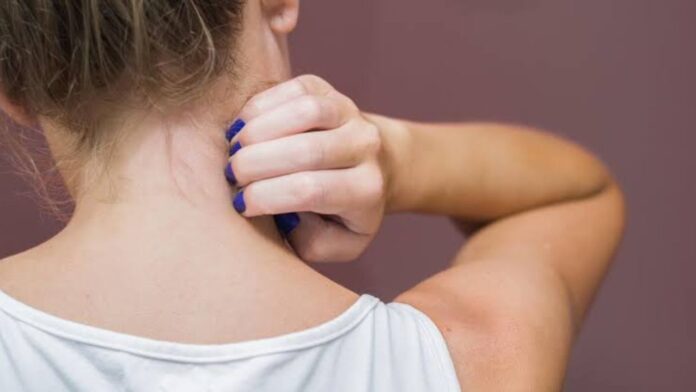Of the many afflictions associated with summer, nothing can surpass itching by its discomfort level. Do you think summertime is only about heat waves, blazing sun, sweat and parched throats? No sir/mam, it’s about itching, and scratching too.
There are two summers for me. One is dry summer which leaves you fried. The other one is wet summer which stew you in your juice! The discomfort of itching is the common factor in both cases.
Itching tends to follow each other like in the domino effect. Suppose you have an itch on your knee. You scratch it to your satisfaction and get relieved, or so you think. Seconds later you have another on your shoulder. You scratch it too. Then maybe your thigh is the next target. The next moment you start scratching here, there and everywhere on your body. Often in some inappropriate place, moment and company, it goes to some unmentionable quarters of your body where you may as well reach but cannot scratch out of decency. Our women folk suffer more than the men, who in desperation can glee fully scratch their crotch with a grimace in broad daylight. Ladies have to bear the ordeal in graceful silence. Of course, I am talking about some men.
The more you scratch, the more you itch. That’s a vicious cycle. It not only downgrades your quality of life but snatches away the dignity from you too.
But why do we scratch when there is an itch? Being a victim of the ordeal each summer, I always wanted to know that.
Itch was first defined by a German doctor Samuel Hafenreffer as – an “Unpleasant sensation that elicits a desire or reflex to scratch”. Haha, as if we didn’t know already. But seriously, by this definition the German physician introduced the study of pruritus; yes, that’s the scientific term for itching, 350 years ago.
When we itch, we scratch by reflex. It serves as a protective mechanism in everyday life. An itch provoked by an insect bite can thus be easily relieved by scratching the affected area. What about the itch which comes back frequently, scratching giving you only temporary relief? It’s called a chronic pruritus or chronic itch. An insect bite gives you an acute itch.
Clinical classification divides Chronic itch into four subtypes.
- Dermatologic itch – The outcome of diseases of the skin.
- Systemic itch – It accompanies the diseases of organs other than the skin. For Example, if you have a certain type of kidney or liver problem you get itchy skin.
- Neuropathic – It results from nerve injury and can arise from diseases or disorders of the Central Nervous System (CNS) or peripheral nervous system.
- Psychogenic itch– Psychological or psychiatric disorders such as obsessive-compulsive disorders and delusions of parasitosis (patient THINKS that he or she is infested with parasites) are the causes of psychogenic itch.
We are not going to discuss in detail the causes of itching. But it must be stated that an itch is triggered by pruritogens. Substances which trigger itching after coming into contact with the skin are called pruritogens. In summer substances like moulds, pollens, and plant and animal matter act as pruritogens. Even your sweat can be a pruritogenic factor in some cases. The most common and well-known pruritogen is histamine. Have you heard of antihistamine medicines? There are other pruritogens too other than histamine.
The nerve fibers in the skin carry the sensation from the skin to the brain via the spinal cord. The sensory information related to pain, temperature, and itch is transported to the brain by one specific nerve Fiber called c-Fiber. C-Fiber is of two types. One is Histaminergic, which is activated by histamine. The other is activated by numerous pruritogens other than histamine and is called Nonhistaminergic.
From early medical research, it seemed the sensation of pain and itch are closely related, so much so that an itch was presumed to be a form of pain with lower intensity. However, the present research Treats the two sensations separately.
Intense research is going on to understand the mechanism of pruritus. Researchers have found that some neurons (nerve cells) send pain and itch signals selectively. They call it the selectivity model. That means you can not experience both sensations at the same time. But you can suppress itch signals with the pain sensation because the number of neurons sending pain signals is too many, that’s what happens when we scratch an itch. Mild pain from scratching suppresses the annoying feeling of itching. It also generates a pleasurable sensation which activates the areas of the brain reward system releasing a happy hormone called serotonin. Interestingly serotonin makes you feel more itchy, so you scratch more, and the cycle continues.
Itching is a defensive mechanism. It serves two purposes.
One – to remove the irritating substance (Pruritogen) from your skin. Two – to give relief to your itching.
A team of researchers also found that there are itch-specific neuronal Fibers which carry only the itch sensation. It is called the Labeled line model.
Why do we get itchy during summer?
There are many factors. In summer you can have a heat rash. This happens when sweat ducts are clogged.
One can have Sun rash after exposure to the sun. It is called photodermatitis.
Skin allergies are common in summer. The Air-born allergens are more active during this season.
In summer your skin dries – up easily, giving you an itchy skin.
An air conditioner can give you relief from summer heat, but it also can give you dry skin. Spending too much time in an air-conditioned room may not be a good idea.
What to do when you have an itch?
Itchyness in summer is a common phenomenon. You don’t have to see a doctor unless it makes you more miserable than you can handle. There are few remedies one can use at home other than over-the-counter antihistamine medicines like Citrazine.
First of all, whatever you do, do not scratch. It will make you feel more itchy. But it is better said than done. It is hard to control the urge to scratch.
So pat or rub gently the affected area instead of scratching. You can use your hand or a towel.
Holding a damp towel dipped in cold water on your skin definitely gives you short-term relief.
Have cool or lukewarm showers a few times a day.
To prevent the skin from drying use unperfumed moisturizer or emollient regularly.
And lastly drink plenty of water and be hydrated. It is good for the skin and the well-being of the whole body. Wear loose cotton clothing covering most of your body to be protected from the sun.







It’s lucid and at the same time informative. Really great article.